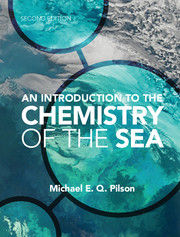Book contents
- Frontmatter
- Contents
- Preface
- Acknowledgments
- 1 Introduction
- 2 The water in seawater
- 3 Salinity, chlorinity, conductivity, and density
- 4 Major constituents of seawater
- 5 Simple gases
- 6 Salts in solution
- 7 Carbon dioxide
- 8 Nutrients
- 9 Trace metals and other minor elements
- 10 Radioactive clocks
- 11 Organic matter in the sea
- 12 Anoxic marine environments
- 13 Exchanges at the boundaries
- 14 Chemical extraction of useful substances from the sea
- 15 Geochemical history of the oceans
- Appendix A The chemical elements
- Appendix B Symbols, units, and nomenclature
- Appendix C Physical properties of seawater
- Appendix D Gases
- Appendix E Carbon dioxide
- Appendix F Dissociation constants and pH scales
- Appendix G Solubility of calcium carbonate
- Appendix H Effects of pressure
- Appendix I Radioactive decay
- Appendix J Geochemical reservoirs, and some rates
- Appendix K Sound absorption
- Epilogue
- Questions for chapters
- Glossary
- References
- Index
- Miscellaneous end matter
- References
14 - Chemical extraction of useful substances from the sea
Published online by Cambridge University Press: 05 February 2013
- Frontmatter
- Contents
- Preface
- Acknowledgments
- 1 Introduction
- 2 The water in seawater
- 3 Salinity, chlorinity, conductivity, and density
- 4 Major constituents of seawater
- 5 Simple gases
- 6 Salts in solution
- 7 Carbon dioxide
- 8 Nutrients
- 9 Trace metals and other minor elements
- 10 Radioactive clocks
- 11 Organic matter in the sea
- 12 Anoxic marine environments
- 13 Exchanges at the boundaries
- 14 Chemical extraction of useful substances from the sea
- 15 Geochemical history of the oceans
- Appendix A The chemical elements
- Appendix B Symbols, units, and nomenclature
- Appendix C Physical properties of seawater
- Appendix D Gases
- Appendix E Carbon dioxide
- Appendix F Dissociation constants and pH scales
- Appendix G Solubility of calcium carbonate
- Appendix H Effects of pressure
- Appendix I Radioactive decay
- Appendix J Geochemical reservoirs, and some rates
- Appendix K Sound absorption
- Epilogue
- Questions for chapters
- Glossary
- References
- Index
- Miscellaneous end matter
- References
Summary
The oceans are a storehouse of some 5 × 1016 tons of mineral matter.
John L. Mero 1965Salt
The ocean is vast, and all (or nearly all) of the chemical elements are present dissolved in the water, so the ocean must contain huge quantities of important and valuable minerals. This idea has led to many schemes to extract one or another of the substances needed or wanted by mankind. In fact there are only a few rather mundane substances that can be extracted at a sufferable cost. The extraction of common salt has been of crucial importance for some peoples in the past, and continues to be economically favorable today. The extraction of water makes it possible for many to live where it would otherwise be impossible.
Consider the Maya. The Classical Maya civilization flourished some 1200 years ago in Central America in what is now Guatemala and Belize, and the adjacent parts of Mexico and Honduras. The evocative remains of their great cities such as Copán and Tikal, their extraordinary stone carvings and other objects, their elaborate and bizarre system of writing, and their detailed and accurate calendar with its implied care in astronomical observations have caught the imagination of many people since the first reports by John Stevens, who discovered Copán and other cities in 1841. This remarkable civilization existed in a hot and humid tropical environment, a situation that imposes certain constraints. With an estimated population of 5 million and little wild animal food available, the Mayans turned much of what now looks like unbroken tropical forest into agricultural fields. With no draft animals, they must have worked hard to tend these fields. The population of Tikal (near the middle of the region) is estimated to have been at least 45 000, a population not reached by the city of London, England, until centuries later.
- Type
- Chapter
- Information
- An Introduction to the Chemistry of the Sea , pp. 368 - 378Publisher: Cambridge University PressPrint publication year: 2012



